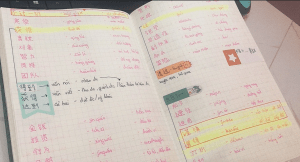Hello everyone, welcome to my blog again.
Time had flown so fast, the study abroad journey has already reached its ending soon. Within these six weeks, I have learned so much from the professors and my classmates. Since it is an online program, I think the hardest thing when getting started on the program is time management. It is already hard to not be able to submerge ourselves into the “authentic” experience that we all wish for; on top of that, we are all overwhelmed with our personal life and keeping up with the classpath; thus, time management is the key to success in this program. There is a time that I want to give up sometimes or just simply don’t have that motivation to sit down at my table and start studying. In this blog, I want to show you a few tips that I used to motivate and stay focused on online learning.
1. Must-Have Items

The most critical materials I have with me are my Planner and my Notebook. The Planner helped keep me on track with all the deadlines, and Notebook keeps all of the learning material together for preview and review purposes.
Then, how do I use them?
It is scientific proof that color-coding helped us work more proficiently. Therefore, I applied this method when using my Planner and Notebook to see things more manageable and remember the materials faster. For the most part, when using my Planner, I will first write down the due date for the work that needs to be done, and whenever I finish with that task, I will highlight green so I know that it is done. In addition to that, I always write down the due date earlier than it is actually due to avoid my procrastination self. With important tasks like project due dates, or testing dates, I will use a red pen to not miss them.
- Take Note Method
Since this is an online learning environment, it is limited to what I can do to enjoy my language learning experience; thus, I try to find joy when taking notes and viewing my notes as art. By doing that, I pushed myself to take beautiful notes and have more motivation to read and study.

(I tried to draw the lesion theme at the beginning of each note, this helped me have a deeper connection with the lesion and the material.)
Next, through my past study experience, I realized that I have always been stuck with one way of taking notes on vocabulary, which is simply writing them down in the order of [character – pinyin – translation], by copying the vocab down into my notebook and does not give the page any extra space, this had also limited my ability to connect the vocab to a bigger picture. With the pace of the TISLP, I learned that previewing is also the primary key to success in class. One of the most efficient routines that I learn work with me is before the class start, I will preview the content, copying down all the vocabs and grammar point, and make sure I give my note plenty of space so I can go back and fill them in later. During lecture time, I will try not to use my notebook but take notes on blank paper. Then after class, I can go back to my note and filling the empty space with the material on the paper. Doing this keeps me more focused during class time and helped me review the materials so much better. Again, I always tried my best to applied color coding when taking my note and keep the notes as neat as possible.

- Learning Environment
Traditionally, we always lean toward finding a quiet, familiar place to maximize our focus and study there. However, when learning a language, the emotional connection to the content is really important because we want to apply what we learn in real life, not just in tests and homework. Thus, changing the learning environment, study methods, and ways of practice is also necessary for learning a foreign language. Some strategies I applied to “learn and play” are daily text with my language partner, watching documentary films, listening to podcast, read Chinese comic books, etc.
In conclusion, even though this whole “study abroad” experience so far does not feel like a traditional study abroad experience, I did not let that get into my head. I had taken this learning opportunity seriously and try to get the most out of it. These intensive learning classes had provided me a chance to learn about the Chinese language and Taiwan culture and learn about many aspects that I didn’t know about myself.
Lyn Doan, M.A. Chinese Language and Culture 2021
Sigur Center 2021 Asian Language Fellow
National Cheng Kung University, Taiwan

